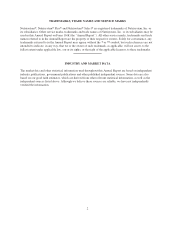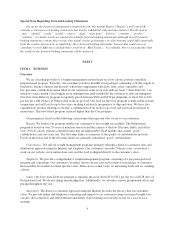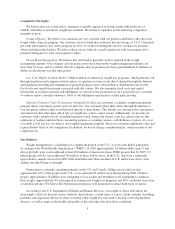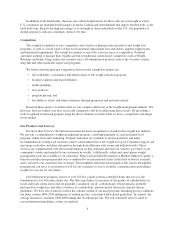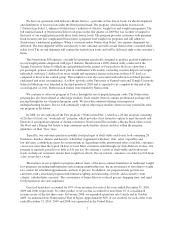Nutrisystem 2010 Annual Report Download - page 10
Download and view the complete annual report
Please find page 10 of the 2010 Nutrisystem annual report below. You can navigate through the pages in the report by either clicking on the pages listed below, or by using the keyword search tool below to find specific information within the annual report.In addition to the health risks, there are also cultural implications for those who are overweight or obese.
U.S. consumers are inundated with imagery in media, fashion and entertainment that depicts the thin body as the
ideal body type. Despite the high percentage of overweight or obese individuals in the U.S., the popularity of
dieting appears to indicate consumers’ desire to be thin.
Competition
The weight loss industry is very competitive and consists of pharmaceutical products and weight loss
programs, as well as a wide variety of diet foods and meal replacement bars and shakes, appetite suppressants
and nutritional supplements. The weight loss market is served by a diverse array of competitors. Potential
customers seeking to manage their weight can turn to traditional center-based competitors such as Weight
Watchers and Jenny Craig, online diet-oriented sites, self-administered products such as the over-the-counter
drug Alli and other medically supervised programs.
We believe that the principal competitive factors in the weight loss market are:
• the availability, convenience and effectiveness of the weight reduction program;
• brand recognition and trustworthiness;
• media spending;
• new products;
• program pricing; and
• the ability to attract and retain customers through promotion and personal referral.
Based on these factors, we believe that we can compete effectively in the weight management industry. We,
however, have no control over how successful competitors will be in addressing these factors. By providing a
well-recognized food-based program using the direct channel, we believe that we have a competitive advantage
in our market.
Our Products and Services
For more than 35 years, the Nutrisystem name has been recognized as a leader in the weight loss industry.
We provide a comprehensive weight management program, consisting primarily of a pre-packaged food
program, online tools and counseling. Trained counselors are available to answer questions and make
recommendations to help each customer achieve and maintain his or her weight loss goal. Customers support and
encourage each other and share information through hosted Internet chat rooms and bulletin boards. These
services are complemented with relevant information on diet, nutrition and exercise, which is provided on our
community website and emailed to our customers bi-weekly. Additionally, online and smart phone weight
management tools are available to our customers. These tools include the interactive Mindset Makeover guide, a
behavior modification program that was co-authored by an international leader in the field of obesity research
and is offered to our customers free of charge. This insightful and motivational guide walks clients through the
program and can serve as an interactive tool for our counselors to use to facilitate communication and enhance
weight loss success for our clients.
Our Nutrisystem program consists of over 150 low calorie, portion-controlled items that serve as the
foundation of a low Glycemic Index diet. The Glycemic Index is a measure of the quality of carbohydrates in
foods and foods on the lower end are generally considered “good” carbohydrates. Our program is perfectly
portioned for weight loss and offers a balance of carbohydrate, protein and fat that meets national dietary
guidelines. We have also worked to reduce the sodium content of our meal program. Including grocery additions,
our plans contain 1800-2200 milligrams of sodium per day, consistent with national guidelines. In contrast, the
average American consumes 2800-4000 milligrams of sodium per day. We will constantly strive to meet or
exceed nutritional guidelines as they are updated.
6






